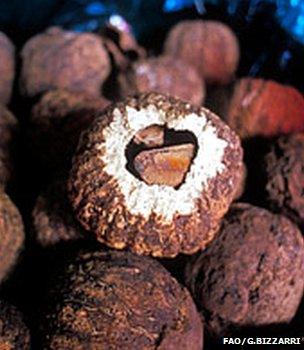Guide reveals Amazon's biological bounty
- Published

The UN has co-produced a study that lists scientific details of Amazon plant species that can be harvested for economic or medicinal purposes.
It is estimated that 80% of people in developing nations depend on non-wood forest products, such as fruit, for nutrition and medicine.
The publication aims to help bridge the gap in knowledge between scientists and local people, the authors have said.
The publication coincides with the end of the International Year of Forests.
The 353-page book, Fruit Trees and Useful Plants in Amazonian Life - co-produced by the Food and Agriculture Organization (FAO), the Center for International Forestry Research (Cifor) and People and Plants International (PPI) - profiles a range of species that offer communities a range of uses.
Fruits of the forest
"Some 80% of people living in the developing world rely on non-wood forest products," explained Eduardo Rojas-Briales, FAO's assistant director-general for forestry.
"The new book provides comprehensive information on fruits and plants, and is a perfect example of how to make our knowledge accessible for poor people to help them maximise the benefits from forest products and services, and improve their livelihoods," he added.
It is estimated that about a quarter of people in developing nations are "functionally illiterate".
In order to overcome this, the book's authors have attempted to communicate as much information as possible in pictures, drawings and numbers.
"Making this book required the collaboration of 90 Brazilian and international researchers willing to present their research to rural villagers in alternative formats, including jokes, recipes and pictures," said Tina Etherington, an FAO publications manager.
"In addition, a number of farmers, midwives, hunters and musicians contributed their valuable insights and experience."
- Published4 August 2009
- Published19 March 2009
- Published19 July 2006
- Published24 September 2007